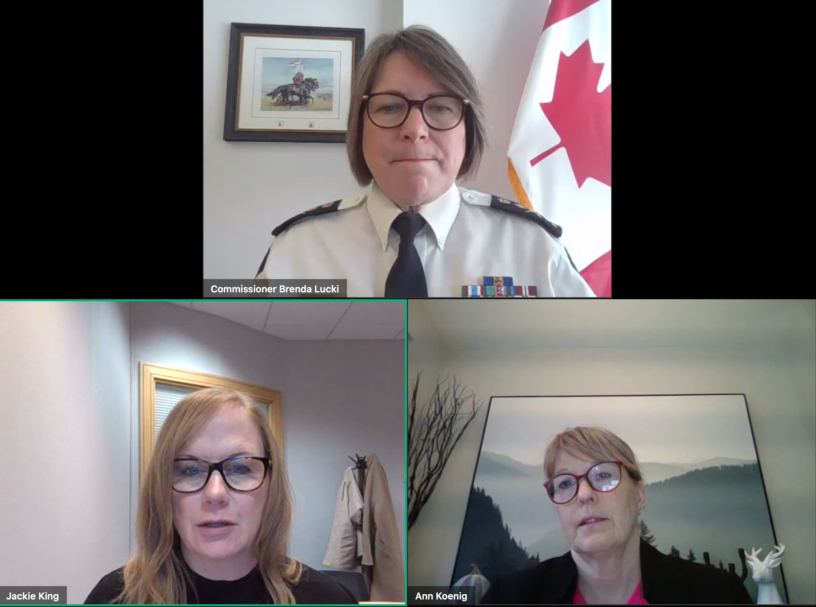We are honoured that RCMP Commissioner Brenda Lucki delivered one of the keynote addresses at the recent AML Intelligence ‘Women in FinCrime’ Summit. Here is her inspiring address on the value of PPPs, the ever-changing challenges in fighting financial crime and the new age of global finance:
Thanks so much to AML Intelligence for the invitation to speak today.
I’m honoured to be included in this panel of inspirational women from the financial crime space.
I would like to note that I am joined here today by the RCMP’s Supt. Ann Koenig [KO-nig], who has served over 15 of her 34 years with the RCMP as a leader in the financial crime sphere. She is currently the District Officer for the Greater Toronto Area Transnational Serious and Organized Crime section, overseeing investigations into organized crime, money laundering and proceeds of crime.
While I am the first female Commissioner of the RCMP, there are many incredibly talented and dedicated women who paved the way for me and the thousands of other women in the RCMP who serve every day.
The New Age of Global Finance certainly presents challenges for Law Enforcement.
Canada, like other countries, is all too aware of the destructive impact of financial crime.
I was involved in the early days of Canada’s anti-money laundering efforts, including Project Compote, which was at the time the largest undercover operation in the history of the RCMP.
We established a fake retail currency exchange business in downtown Montréal that we called the Centre International Monétaire de Montréal. Staffed by undercover police personnel, in 1990 we began to use it to exchange money, and we lured in money launderers of all stripes. Four year later when Project Compote ended, 57 people were arrested and charged with hundreds of counts of money laundering and drug offences.
We have come a long way from those early days of investigating financial crime. Investigative techniques have changed dramatically in response to changing criminal behaviour.
Now more than ever, criminals can easily exploit new technology and FinTech to evade law enforcement and achieve their goals.
New challenges for law enforcement in the financial crime space are constantly emerging.
With the evolution of transnational crime, we’re faced with jurisdictional hurdles that make it so much harder to investigate these complex crimes. This further highlights the need for us all to work together and share intelligence. Greater collaboration between public and private institutions will be needed to enhance the intelligence picture.
The evolution of financial crime is also forcing us to change how we combat crypto laundering and the criminal use of virtual assets.
We are no longer talking about your basic Bitcoin tracing. The greatest threat for law enforcement is now characterized by sophisticated tools to launder money such as privacy-protecting coins, the use of decentralized exchanges, cross-chain bridges and coin swap services to launder money. Developments in this space are happening at a dizzying pace.
Another challenge for law enforcement is data.
Of course, information is critical for investigations, and the work of Financial Intelligence Units is central to the investigative success of law enforcement, there is no doubt.
But as you know, financial crime investigations can produce a staggering amount of information, which can be difficult for investigators to analyze and/or even to triage for relevance.
I challenge all of us here today to continue the work that is underway to push for improvements when it comes to information production and analysis. Solutions here will improve the efficiency and quality of everyone’s work.
That said, at times we have too little data.
Fraud, for example, is happening across the world but is vastly underreported by citizens and institutions. We need this data because without it, law enforcement is limited in its ability to understand the true scope and interconnectivity of these crimes, particularly with the global rise of cyber-enabled fraud.
I am obviously only scratching the surface of the challenges, there is so much more to say and I don’t have all of the answers.
But I can tell you about our approach, and how the RCMP is concentrating its efforts to tackle complex financial crime in this new landscape.
We have and will continue to make more investments in technology and training. This is helping us modernize how we identify and investigate financial crime.
Like many of our global partners, we continue to leverage technological tools to assist and support investigations. At the RCMP, this includes things like more advanced analytics to trace assets abroad, covert interception tools, modernized case management software, and effective technologies in the field to help organize and process the big volumes of evidence and data that is often uncovered during investigations.
Of course we always balance the operational need for these tools with a citizen’s right to privacy. The RCMP uses these tools in line with its commitments to transparency and accountability.
The RCMP is also working to modernize the support structures that investigators need to be successful in tackling complex financial crime.
New technologies and virtual assets such as cryptocurrency can be really hard to understand. A collective effort needs to be made to ensure all partners in our judicial system receive adequate training. We also need to encourage more effective cryptocurrency-related investigations and prosecutions. We can’t do it alone.
Relevant, innovative training and the creation of specialized financial crime units, coupled with advanced IM/IT systems will enable us to attract and retain the right personnel to advance our efforts. Increasing women and diversity in policing is also critical to being able to tackle these threats from new perspectives.
For example, we’ve created fusion teams and we continue to collaborate with other Canadian partners with specific skills and expertise.
We also have initiatives such as the new RCMP Civilian Criminal Investigators Program. This program has allowed us to hire civilians with diverse specialized skills to help with our investigations. I’m talking about professionals such as bankers, brokers, programmers, lawyers and accountants. Their expertise and interest are recruited to become integrated members of financial crime and cybercrime teams.
International Cooperation / PPPs
These investments in technology, training, people and modernization are important.
Yet, in this world of slim resources, law enforcement must also rely on other opportunities to minimize the remaining gaps that still exist.
We can’t tackle transnational crime alone. We need collaboration with local law enforcement and we need international cooperation to leverage each other’s capacities and legislation. We also need to use public private partnerships to advance this work together.
When we combine the tools and people, the results speak for themselves.
Take for example, the RCMP’s investigation, Project OLUNAR, which began in August 2020, after the FBI requested our assistance to identify a suspect in their NetWalker ransomware investigation. The RCMP seized approximately $36 million dollars in bitcoin and cash.
The accused was charged then extradited to the U.S., and was sentenced to a 20-year prison term.
This is what collaboration within the law enforcement community can achieve.
We’ve also enjoyed great success working closely with trusted private sector stakeholders.
Project COLLECTEUR, was a transnational money laundering investigation that started in 2016 when the U.S. Drug Enforcement Agency provided us with a key tip of a Canadian who was involved in one of their cases.
These suspects were orchestrating global informal value transfer networks and using trade based money laundering schemes. They posed as fictitious import/export wholesale chicken wings business where they moved millions of dollars between Dubai and Canada, under the guise of legitimate trade.
Our investigation found that this network had been operating for over 30 years.
More than 300 police officers and partners were involved in this file. In February 2019 the RCMP arrested 17 individuals and was able to take down this vast international money laundering network. The value of seized and restrained assets was over $32.8 million dollars.
Afterwards, we decided to share key money laundering typologies with our trusted major banks about this investigation. We wanted to use their advanced analytics and correspondent banking networks to learn even more about such schemes.
What they were able to uncover was quite astounding.
We quickly learned that the same network had an undisrupted trade-based money flow, using a variety of fictitious trade companies in the tens of millions per month was still flowing to Canada and globally.
The RCMP is still investigating through much of the intelligence gleaned from this, but it won’t be enough.
How do we tackle such global threats? What can we do about this?
I do not have these answers, but International cooperation and public private partnerships will be critical to our investigative strategies to tackle these complex schemes moving forward. But we can’t be complacent.
Other Opportunities
There is a lot more criminality out there we must tackle.
We have to prioritize quality over quantity when it comes to intelligence. This means collaboration with financial sectors and compliance partners, to seek ways to transmit information that targets exactly what law enforcement needs. For our part, we share the right typologies and information with the private sector to help them develop useful and actionable intelligence and data.
We must draw upon the expertise of the private sector and the tech firms that specialize in the cryptocurrency and virtual assets space. Otherwise, we will very quickly be left behind savvy criminals…far, far behind.
We need to identify and address our regulatory and legislative gaps, particularly with respect to digital technologies and virtual assets. While finding solutions here can be difficult, inaction is simply not an option – we must modernize the legislative and regulatory tools that we have, and use them to achieve our law enforcement goals.
We also need to continue the good work that countries are doing to address beneficial ownership gaps. There is growing recognition that gaps in beneficial ownership is a national security issue. In the last 5 years many countries have made tremendous progress with respect to public and centralized registries, which is key to addressing these gaps. In Canada, we have committed to establishing a publically accessible registry of beneficial ownership later this year.
Law enforcement also needs to greatly improve its asset recovery efforts. Estimates indicate that less than 1% of criminal proceeds are confiscated, it’s no surprise that in late 2022, experts at a Financial Action Task Force meeting in Singapore recommended that asset recovery be a key component of a country’s approach to combating financial crimes, money laundering and terrorist financing, and that it be a strategic and organizational priority.
If we can bolster our efforts on this issue, together we can hit criminals right where it hurts – in the pocketbook.
Conclusion
As I’ve said, there’s much work ahead.
Globally, law enforcement efforts on financial crime must be aligned and tireless to be effective.
Without a doubt, our collective success is tied to our ability to work together, and innovate.
Share this on:
Follow us on:












